Related Research Articles
Feminism is a range of socio-political movements and ideologies that aim to define and establish the political, economic, personal, and social equality of the sexes. Feminism holds the position that societies prioritize the male point of view and that women are treated unjustly in these societies. Efforts to change this include fighting against gender stereotypes and improving educational, professional, and interpersonal opportunities and outcomes for women.
Black feminism is a branch of feminism that focuses on the African-American woman's experiences and recognizes the intersectionality of racism and sexism. Black feminism philosophy centers on the idea that "Black women are inherently valuable, that [Black women's] liberation is a necessity not as an adjunct to somebody else's but because of our need as human persons for autonomy."
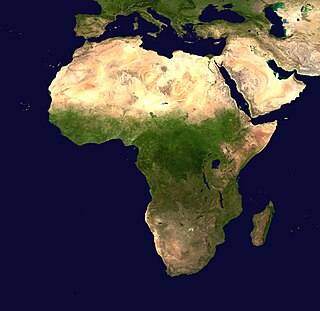
African feminism includes theories and movements which specifically address the experiences and needs of continental African women. From a western perspective, these theories and movements fall under the umbrella label of Feminism, but this categorization is misleading for many branches of African "feminism". African women have been engaged in gender struggle since long before the existence of the western-inspired label "African feminism," and this history is often neglected. Despite this caveat, this page will use the term feminism with regard to African theories and movements in order to fit into a relevant network of Wikipedia pages on global feminism. Because Africa is not a monolith, no single feminist theory or movement reflects the entire range of experiences African women have. African feminist theories are sometimes aligned, in dialogue, or in conflict with Black Feminism or African womanism. This page covers general principles of African feminism, several distinct theories, and a few examples of feminist movements and theories in various African countries.
Social feminism is a feminist movement that advocates for social rights and special accommodations for women. It was first used to describe members of the women's suffrage movement in the late nineteenth and early twentieth centuries who were concerned with social problems that affected women and children. They saw obtaining the vote mainly as a means to achieve their reform goals rather than a primary goal in itself. After women gained the right to vote, social feminism continued in the form of labor feminists who advocated for protectionist legislation and special benefits for women. The term is widely used, although some historians have questioned its validity.
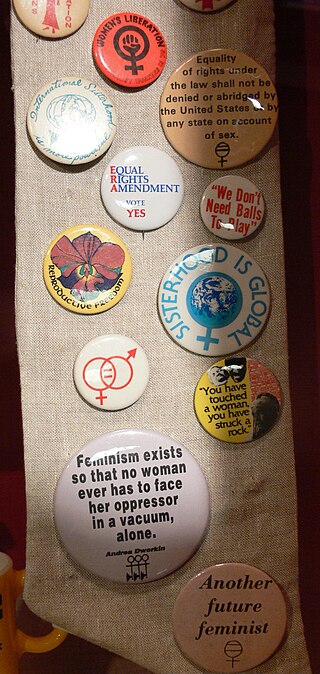
A variety of movements of feminist ideology have developed over the years. They vary in goals, strategies, and affiliations. They often overlap, and some feminists identify themselves with several branches of feminist thought.
The following is a timeline of the history of feminism.
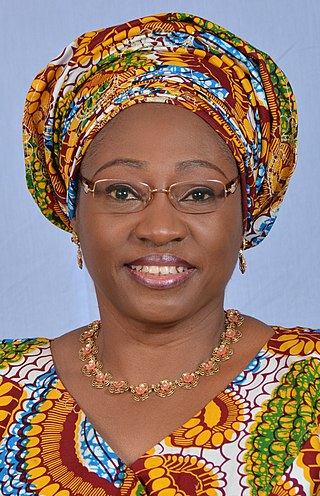
Bisi Adeleye-Fayemi is a Nigerian-British feminist activist, writer and policy advocate. She was first lady of Ekiti State, Nigeria as wife of Ekiti State governor Kayode Fayemi from 2018 to 2022. She previously served as first lady from 2010 to 2014 during her husband's first term in office. In 2001, she co-founded the African Women's Development Fund (AWDF), the first Pan-African grant-making organisation. She serves as a UN Women Nigeria Senior Advisor, and was appointed as a Visiting Senior Research Fellow at King's College London in 2017. She is CEO of Above Whispers Limited, and runs an online community called Abovewhispers.com.
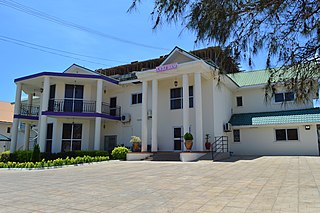
The African Women's Development Fund (AWDF) is the first pan-African foundation to support the work of women's rights organisations in Africa. AWDF was founded in 2001 by Bisi Adeleye-Fayemi, Joana Foster and Hilda M. Tardia. AWDF belongs to the International Network of Women's Funds, an umbrella organisation for feminist foundations that focus on supporting women's human rights.
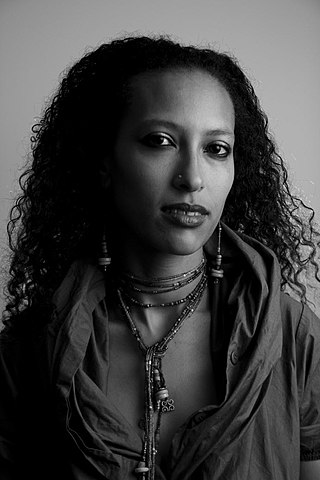
Jessica Horn is a Ugandan feminist activist, writer, poet, and technical advisor on women's rights Her work focuses on women's rights, bodily autonomy and freedom from violence, and African feminist movement building. She was named as an African woman changemaker by ARISE Magazine and as one of Applause Africa's "40 African Changemakers under 40". She joined the African Women's Development Fund as director of programmes in October 2015.
Elizabeth Maria "Mai" Musodzi Ayema was a Zimbabwean feminist and social worker from Salisbury.
Gender inequality refers to unequal treatment or perceptions of individuals wholly or partly due to their gender or sex. It arises from differences in socially constructed gender roles. Gender inequality in Nigeria is influenced by different cultures and beliefs. In most parts of Nigeria, women are considered subordinate to their male counterparts, especially in Northern Nigeria as well as in other sectors including the Nigeria music industry, politics, and education sector. It is generally believed that women are best suited as home keepers.

Feminism in South Africa concerns the organised efforts to improve the rights of the girls and women of South Africa. These efforts are largely linked to issues of feminism and gender equality on one hand, and racial equality and the political freedoms of African and other non-White South African ethnic groups on the other. Early feminist efforts concerned the suffrage of White women, allowing them to vote in elections beginning from 1930s, and significant activism in the 1950s to demand equal pay of men and women. The 1980s were a major turning point in the advancement of South African women, and in 1994, following the end of the apartheid regime, the status of women was bolstered by changes to the country's constitution. Since the end of apartheid, South African feminism is a contribution associated with the liberation and democratization of the country, however, the movement still struggles with the embedded conservative and patriarchal views within some segments of South African society.
White feminism is a term which is used to describe expressions of feminism which are perceived as focusing on white women but are perceived as failing to address the existence of distinct forms of oppression faced by ethnic minority women and women lacking other privileges.Whiteness is crucial in structuring the lived experiences of white women across a variety of contexts. The term has been used to label and criticize theories that are perceived as focusing solely on gender-based inequality. Primarily used as a derogatory label, "white feminism" is typically used to reproach a perceived failure to acknowledge and integrate the intersection of other identity attributes into a broader movement which struggles for equality on more than one front. In white feminism, the oppression of women is analyzed through a single-axis framework, consequently erasing the identity and experiences of ethnic minority women the space. The term has also been used to refer to feminist theories perceived to focus more specifically on the experience of white, cisgender, heterosexual, able-bodied women, and in which the experiences of women without these characteristics are excluded or marginalized. This criticism has predominantly been leveled against the first waves of feminism which were seen as centered around the empowerment of white middle-class women in Western societies.
Joana Foster was a Ghanaian-British activist and lawyer.
Feminism in Pakistan refers to the set of movements which aim to define, establish, and defend the rights of women in Pakistan.This may involve the pursuit of equal political, economic, and social rights, alongside equal opportunity. These movements have historically been shaped in response to national and global reconfiguration of power, including colonialism, nationalism, Islamization, dictatorship, democracy, and the War on Terror. The relationship between the women's movement and the Pakistani state has undergone significant shifts from mutual accommodation to confrontation and conflict.
Doo Aphane is a Swazi lawyer and women's rights campaigner. She has worked with many human and women's rights organisations. In 2012 she was successful in changing Swaziland's law to allow married women to hold property in their own name.

Isabella (Bella) Matambanadzo is a Zimbabwean writer, gender and feminist activist active with the African Feminist Forum. With a background in print, radio and television Journalism, she has used media to amplify women's voices. She also has a background in reporting on breaking news stories in and around Africa having previously worked with Reuters News Agency from 1999 to 2001.

Feminist rhetoric emphasizes the narratives of all demographics, including women and other marginalized groups, into the consideration or practice of rhetoric. Feminist rhetoric does not focus exclusively on the rhetoric of women or feminists, but instead prioritizes the feminist principles of inclusivity, community, and equality over the classic, patriarchal model of persuasion that ultimately separates people from their own experience. Seen as the act of producing or the study of feminist discourses, feminist rhetoric emphasizes and supports the lived experiences and histories of all human beings in all manner of experiences. It also redefines traditional delivery sites to include non-traditional locations such as demonstrations, letter writing, and digital processes, and alternative practices such as rhetorical listening and productive silence. According to author and rhetorical feminist Cheryl Glenn in her book Rhetorical Feminism and This Thing Called Hope (2018), "rhetorical feminism is a set of tactics that multiplies rhetorical opportunities in terms of who counts as a rhetor, who can inhabit an audience, and what those audiences can do." Rhetorical feminism is a strategy that counters traditional forms of rhetoric, favoring dialogue over monologue and seeking to redefine the way audiences view rhetorical appeals.
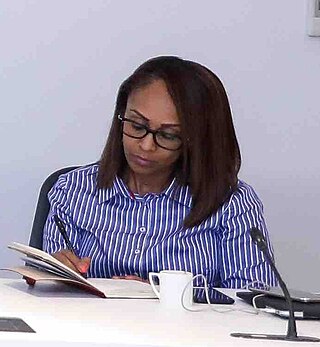
Billene Seyoum Woldeyes is an Ethiopian politician, poet, author and feminist who is serving as the Foreign Press Secretary for the Office of Prime Minister of Ethiopia since 5 November 2018. Billene speaks as the prime minister's foreign spokesperson in English.
References
- ↑ Tomupeishe Maphosa (16 April 2013). "African Feminists" (PDF). Retrieved 1 June 2013.[ permanent dead link ]
- ↑ Jessica Horn, "Tales of the lionesses: the third African Feminist Forum", openDemocracy, 20 October 2010.
- ↑ "4th African Feminist Forum: Voice, Power and Soul, Harare, Zimbabwe April 9-12, 2016", AWDF.
- ↑ "About", African Feminist Forum.
- ↑ "Doo Aphane". Initiative for Strategic Legislation in Africa. Retrieved 2 January 2018.
- ↑ "Jessica Horn". African Feminist Forum (in French). 2016-03-14. Retrieved 2017-11-30.
- ↑ "Bisi Adeleye-Fayemi". African Feminist Forum (in French). 2016-03-14. Retrieved 2017-11-30.
- ↑ "Everjoice Win". African Feminist Forum (in French). 2016-03-14. Retrieved 2018-01-02.
- ↑ "Mary Wandia". African Feminist Forum (in French). 2016-03-14. Retrieved 2018-01-02.